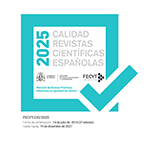The Collusion of Feminist and Postmodernist Impulses in E.L. Doctorow’s "Ragtime"
Abstract
Many critics of Doctorow have classified him as a postmodernist writer, acknowledging that a wide number of thematic and stylistic features of his early fiction emanate from the postmodern context in which he took his first steps as a writer. Yet, these novels have an eminently social and ethical scope that may be best perceived in their intellectual engagement and support of feminist concerns. This is certainly the case of Doctorow’s fourth and most successful novel, Ragtime. The purpose of this paper will be two-fold. I will explore Ragtime’s indebtedness to postmodern aesthetics and themes, but also its feminist elements. Thus, on the one hand, I will focus on issues of uncertainty, indeterminacy of meaning, plurality and decentering of subjectivity; on the other hand, I will examine the novel’s attitude towards gender oppression, violence and objectification, its denunciation of hegemonic gender configurations and its voicing of certain feminist demands. This analysis will lead to an examination of the problematic collusion of the mostly white, male, patriarchal aesthetics of postmodernism and feminist politics in the novel. I will attempt to establish how these two traditionally conflicting modes coexist and interact in Ragtime.Downloads
Article download
License
In order to support the global exchange of knowledge, the journal Complutense Journal of English Studies is allowing unrestricted access to its content as from its publication in this electronic edition, and as such it is an open-access journal. The originals published in this journal are the property of the Complutense University of Madrid and any reproduction thereof in full or in part must cite the source. All content is distributed under a Creative Commons Attribution 4.0 use and distribution licence (CC BY 4.0). This circumstance must be expressly stated in these terms where necessary. You can view the summary and the complete legal text of the licence.









